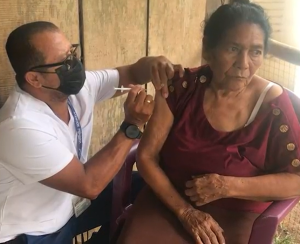Frontline health workers go a long way vaccinating people along the Costa Rica-Nicaragua border: A journalist reports
Irene Rodríguez Salas, a health journalist based in Costa Rica, recently visited several communities along the Costa Rican border with Nicaragua to investigate the challenges of COVID-19 vaccination and routine immunization.
She shared her experience covering the work of frontline health workers prior to this year’s World Health Worker Week. Her reporting trip was the basis for several multimedia stories for La Nación daily.
Traveling East to West, she went to remote locations, including communities north of Sarapiqui, Boca San Carlos, Boca Cureña, Los Chiles and Las Vueltas de la Cruz. (Watch a video of the vaccination rollout in Costa Rican border communities in Spanish.)

“I saw very hard-working people, who make commendable efforts so that no one is left without their COVID vaccine dose, and so that these doses are not wasted.”
Only Pfizer and Moderna’s COVID-19 vaccines are being deployed in that area, she explained, which can make rollout much more complex due to cold chain and other logistical requirements. “If there are leftover doses, health workers must find someone to give them to.”
“I watched health workers who knew each member of the community very closely. They knew where they lived, where they worked, how many people were in each family, how many were vaccinated, how many were pending, how many refused the vaccine. That knowledge of where they do their work is fantastic.”
The value of health workers protecting lives in remote communities
“One health worker caught my attention. Fanier Sandoval, who works in the borderlands of Sarapiqui,” she says. “To ensure people would not be left without their COVID-19 vaccine, he would ride on buses to vaccinate there or cross rivers, and even went to a funeral to vaccinate at the end of the burial!” (Watch a video in Spanish of Fanier Sandoval.)
Fanier “works in communities that are very difficult to reach, where public transportation leaves for the nearest town only once a week and the price is unaffordable for many people, and so he makes his own way to each place, crossing rivers, farms, bridges,” Irene explains.
“I accompanied him during one of his vaccination days and saw him go 20 minutes out of his route just to bring the neonatal screening heel prick to a house where there was no access to public transportation and the mother could not travel to the health center with her baby.” (Watch the video in Spanish.)
“Without the service of these workers, communities would be alone in accessing health services.”
Decision-makers can help health workers continue and expand their work and we can all recognize their work
Irene recommends decision-makers to “be aware of the existence of community health workers.”
“Many big decision-makers are not even aware of community health care efforts and what health care workers do,” she highlights.
“They need to be provided with what they require to do their work: supplies, resources, training, education and a competitive salary to compensate for the long hours of work in hard-to-reach places.”
Irene believes that we can all be part of making things better. We must start by “being aware that health workers’ efforts exist, appreciating and thanking them, spreading the word about what they do.” She adds that if there are health workers in our community, “thanking them and following their guidance and recommendations” can make a big difference.
Irene Rodríguez Salas is a fellow of the Global Health Reporting Initiative: Vaccines and Immunization, led by International Women’s Media Foundation (IWMF) with support from Sabin Vaccine Institute’s Immunization Advocates program.
The fellowship is aimed at providing journalists in Latin America and Africa, like her, with learning, funding and mentoring opportunities to cover vaccine acceptance and demand and the impact the COVID-19 pandemic and vaccine are having on routine immunization programs.
Learn more about how Immunization Advocates is working with journalists and health workers to help people get vaccinated and protect their lives.




